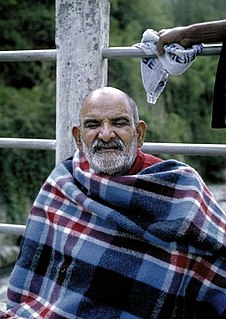A Quote by Jiddu Krishnamurti
If you have a great many desires, you will gradually eliminate them one by one, until you allow certain desires to dominate and the others to die away.
Related Quotes
Buddha says this is how one should be - no desire, because all desires are futile. They are about the future; life is in the present. All desires distract you from the present, all desires distract you from life, all desires are destructive of life, all desires are postponements of life. Life is now and the desire takes you away, farther and farther away from now. And when we see that our life is misery we go on throwing the responsibility on others, and nobody is responsible except us.
If a man gives way to all his desires, or panders to them, there will be no inner struggle in him, no 'friction,' no fire. But if, for the sake of attaining a definite aim, he struggles with desires that hinder him, he will then create a fire which will gradually transform his inner world into a single whole.
A thoroughly socialized person is one who desires only the rewards that others around him have agreed he should long for - rewards often grafted onto genetically programmed desires.A person who cannot override genetic instructions when necessary is always vulnerable..The solution is to gradually become free of societal rewards and learn how to substitute for them rewards that are under one's own powers.
There are urges and urges; you are exploding with urges, desires. You don`t have one desire, you have many desires. Not only that you have many desires, you have contradictory desires. If one is fulfilled, the other, which is its contradiction, remains unfulfilled and you are in misery. If the other is fulfilled, then something else remains unfulfilled.
What is it, in your opinion, to be a great nobleman? It is to be master of several objects that men covet, and thus to be able to satisfy the wants and the desires of many. It is these
wants and these desires that attract them towards you, and that make them submit to you: were it not for these, they would not even look at you; but they hope, by these services... to obtain
from you some part of the good which they desire, and of which they see that you have the disposal.
Prayer is the offering up of our desires to God in the name of Christ, for such things as are agreeable to his will. It is an offering of our desires. Desires are the soul and life of prayer; words are but the body; now as the body without the soul is dead, so are prayers unless they are animated with our desires.
Why do you dream? - because there are so many desires unfulfilled, and to live with unfulfilled desires is painful. In dream you try to fulfill them; in dream you create a false feeling of fulfillment. Hence your dreams show much about you: what your desires are, what you want to become. But if you want to become anything in life, you are asleep.
In the West, there's a myth that freedom means free expression-that to follow all desires wherever they take one is true freedom. In fact, as one serves the mind, one sees that following desires, attractions, and repulsions is not at all freedom, but is a kind of bondage. A mind filled with desires and grasping inevitably entails great suffering. Freedom is not to be gained through the ability to perform certain external actions. True freedom is an inward state of being. Once it is attained, no situation in the world can bind one or limit one's freedom.
Provide yourself with such work for your hands as can be done, if possible, both during the day and at night, so that you are not a burden to anyone, and indeed can give to others, as St. Paul the Apostle advises (cf. I Thess. 2:9; Eph. 4:28). In this manner you will overcome the demon of listlessness and drive away all the desires suggested by the enemy; for the demon of listlessness takes advantage of idleness. 'Every idle man is full of desires' (Prov. 13:4 LXX).
That is Buddha`s meaning of nirvana: to be free from life and death, to be free from desire. The moment you are free from all desires... remember, I repeat, ALL desires. The so-called religious, spiritual desires are included in it, nothing is excluded. All desires have to be dropped because every desire brings frustration, misery, boredom. If you succeed it brings boredom; if you fail it brings despair. If you are after money there are only two possibilities: either you will fail or you will succeed. If you succeed you will be bored with money.
Every time you have a desire, in a certain sense you have a goal, something you would like to be, do, or have. Some desires are merely passing fancies, but others stay with us and go deeper. Our desires and our goals give us direction and focus. They help point us down our path of action in our life.





































